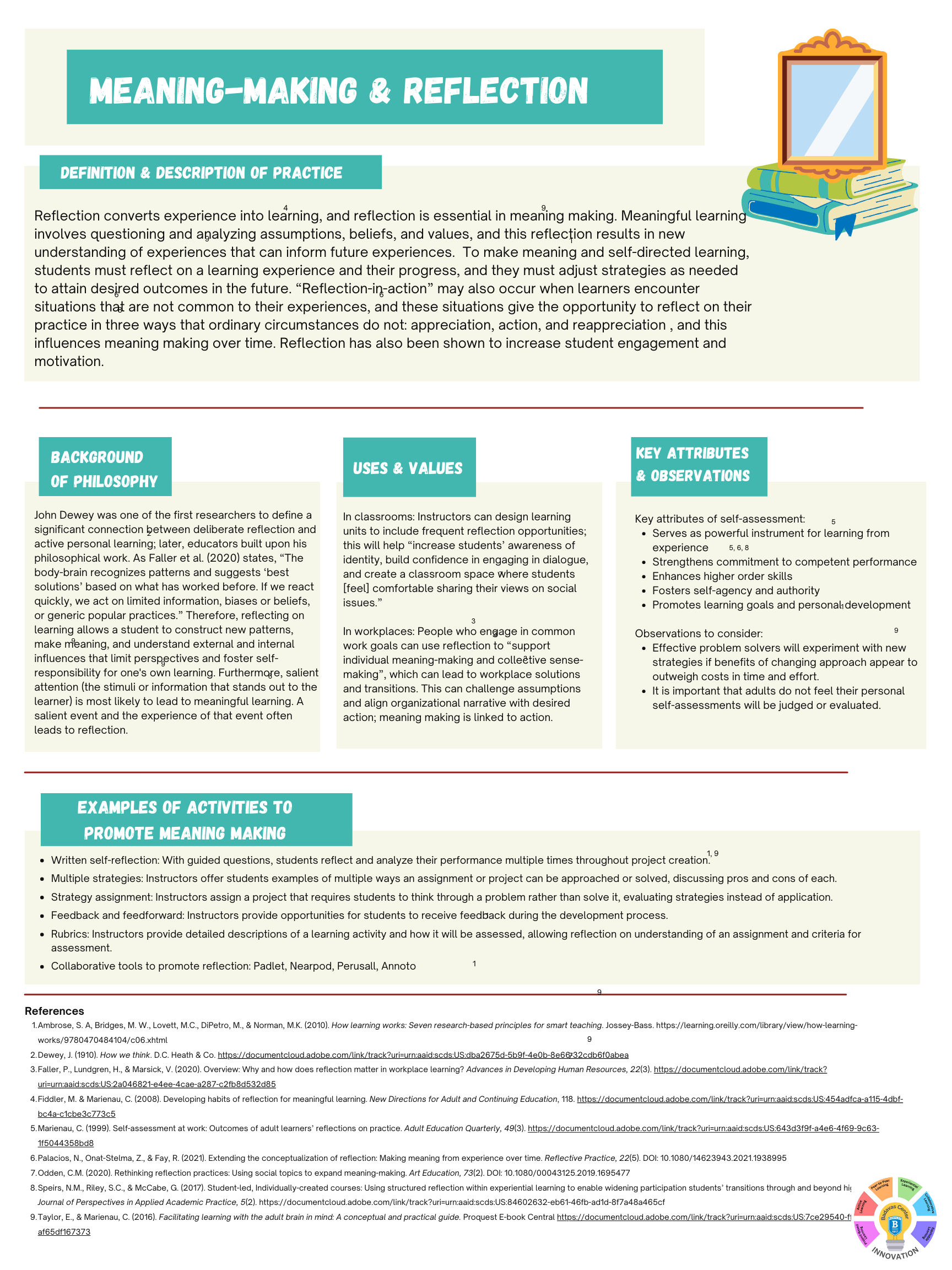Reflection
Reflection plays a pivotal role in the classroom and the broader learning process, serving as a bridge between experience and understanding. It allows students to pause, analyze, and internalize their experiences, fostering deeper comprehension and critical thinking. By encouraging reflection, educators empower students to make connections between theory and practice, identify areas for growth, and develop metacognitive skills that are essential for lifelong learning. There are multiple ways to integrate reflective practice into your teaching. See examples here and visit us in the Badavas Center to ideate more.
Reflection and Self-Regulated Learning:
In higher education, the spectrum of learning encompasses not only formal programs but also informal experiences. Informal learning permeates our daily lives, whether through conversations, media, or actions, yielding new insights incidentally. Conversely, intentional learning emerges as a deliberate, strategic endeavor, characterized by cognitive processes with learning as the primary objective, as delineated by Bereiter & Scardamalia (1989)—an oldie but goodie.
The intentional educator orchestrates experiences with planning, ensuring each component serves a purpose toward the overarching learning goals. Similarly, intentional learners actively monitor their progress, engaging in constructive self-assessment, and seeking out opportunities aligned with their life objectives. This approach mirrors the characteristics of a self-regulated learner, deemed a crucial competency in the 21st century.
Successful self-regulated learners show a keen awareness of their learning needs, making choices about what, how, and when to learn, and whom to learn from. They navigate their learning journey efficiently and effectively, leveraging resources and experiences from others to achieve their study goals. Thus, the integration of intentional learning practices, underpinned by self-regulation, empowers students to not only accumulate knowledge but also develop the skills necessary for lifelong learning and personal growth.
The concept of self-regulation holds profound implications for student learning, as elucidated by Carneiro et al. (2011) and Girash (2014). Carneiro et al. (2011) argues that “self-regulation involves cognitive, affective, motivational, and behavioral components” (p. 4). Specifically, as highlighted by Zimmerman's (2008) SRL model, students engage in a systematic process of “1) self-evaluation and monitoring, 2) goal setting and strategic planning, 3) strategy implementation and monitoring and 4) strategic outcome monitoring” (p. 4).
Like the metacognitive approach described by Girash (2014), students must critically assess their learning strategies and academic performance. By actively monitoring their progress and adjusting their approaches accordingly, students cultivate a sense of agency and ownership over their learning journey. Importantly, as Girash notes, “metacognitive instruction can make students less anxious about making mistakes” (p. 156), empowering students to view mistakes as opportunities for growth rather than indicators of failure.
Carneiro et al.'s emphasis on self-evaluation underscores the importance of reflective practices in fostering student self-regulation. By encouraging students to evaluate their learning outcomes and draw conclusions for future activities, educators facilitate the development of metacognitive skills essential for lifelong learning. We often think about having accountability partners for our work, but what both Carneiro et al. and Girash bring to light is the importance of being your own partner, too.
Useful References and Resources:
Carneiro, R., Lefrere, P., Steffens, K., & Underwood, J. (Eds.). (2011). Self-regulated learning in technology enhanced learning environment: A European perspective. Rotterdam: Sense Publishers.
Girash, J. (2014). Metacognition and instruction. In V. A. Benassi, C. E. Overson, & C. M. Hakala (Eds.), Applying science of learning in education (pp. 152–168). American Psychological Association.
Zimmerman, B.J. (2008). Investigating self-regulation and motivation: Historical background, methodological developments, and future prospects, American Educational Research Journal, 45(1), 166-183.


